‘A New Catholic Moment in the United States’: Recap of the Catholic Convocation
July 1-4 gathering strove to equip Catholic leaders with tools, knowledge and a common purpose to meet the next years with confidence.

ORLANDO, Fla. — More than 3,500 Catholic leaders from across the United States gathered in Orlando, Florida, for the “Convocation of Catholic Leaders: The Joy of the Gospel in America” July 1-4, which was held as a direct response to Pope Francis’ 2013 apostolic exhortation Evangelii Gaudium (The Joy of the Gospel).
The unprecedented and invitation-only gathering of Church leaders in the United States’ dioceses, apostolates and communities was intended to equip the Church in the U.S. for a new era of evangelization in the 21st century. EWTN provided live coverage.
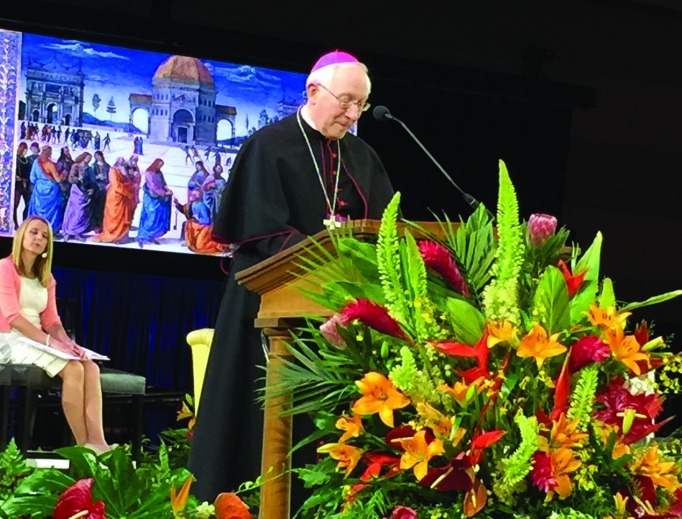
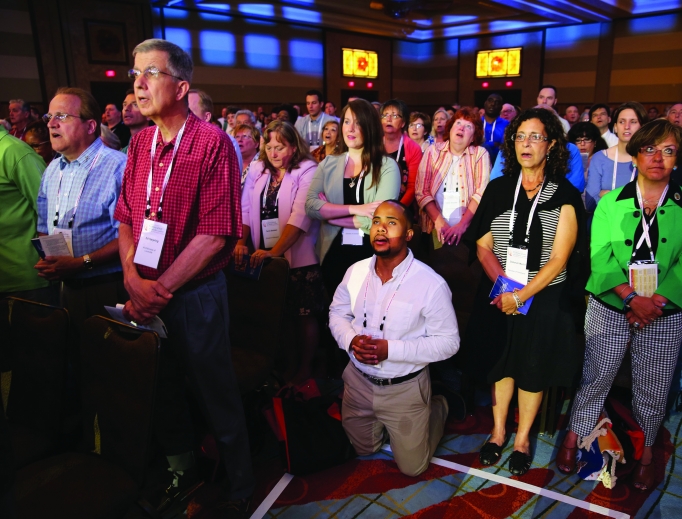
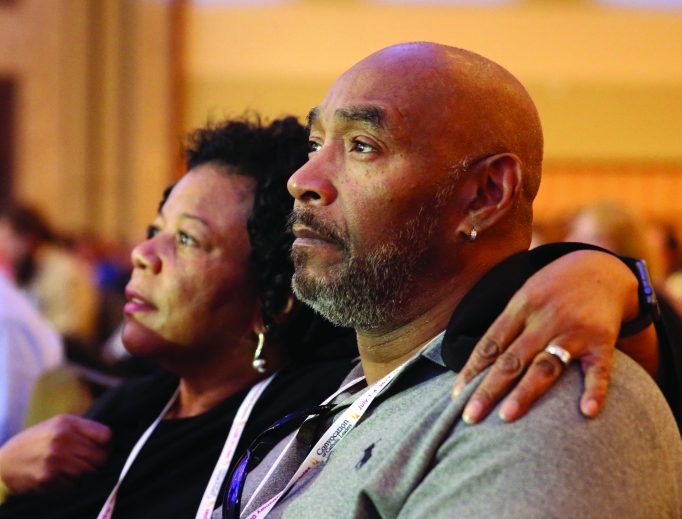
Jonathan Reyes, executive director of the U.S. Conference of Catholic Bishops’ Department of Justice, Peace and Human Development and one of the key organizers of the convocation, told the Register, “It succeeded in gathering men and women who love the Church — from all over the U.S., from various cultural backgrounds and with different roles and perspectives in the Church, and from major Catholic institutions as well as Catholic professionals — with their bishops to pray together, reflect on Evangelii Gaudium and invite the Holy Spirit to lead us in going forth, as Pope Francis has said time and again.”
The convocation came at a time of immense division and spiritual crisis in the country, and there was an understandable temptation to focus on the challenges that are all too clear: assimilation and pastoral care for the booming immigrant population, materialism and secularization, the steady encroachment on religious freedom and a collapse of a baseline understanding of what it means to work for the common good and to have shared values.
Each day of the convocation was placed under a specific theme. Day one was given the title of “Unity,” day two looked at “Landscape and Renewal,” and day three was taken up with “Work and Witness.”
The attendees spent the days in prayer and discussion, hearing from a series of plenary speakers and then using a large number of breakout panels to engage fully in the host of opportunities and challenges facing American Catholicism. The breakout panels for smaller groups were intended for specialized themes relevant to the pressing pastoral needs of the attendees, while the plenary sessions presented several keynote speakers and panelists who are recognized nationally for their expertise, including Cardinal Donald Wuerl of Washington, Archbishop José Gomez of Los Angeles, Auxiliary Bishop Robert Barron of Los Angeles, law professor Helen Alvaré, Supreme Knight Carl Anderson of the Knights of Columbus and Hosffman Ospino, associate professor of Hispanic ministry and religious education at Boston College and a leading researcher into the current demographic realities of the Church in the U.S. (See speaker-related In Person.)
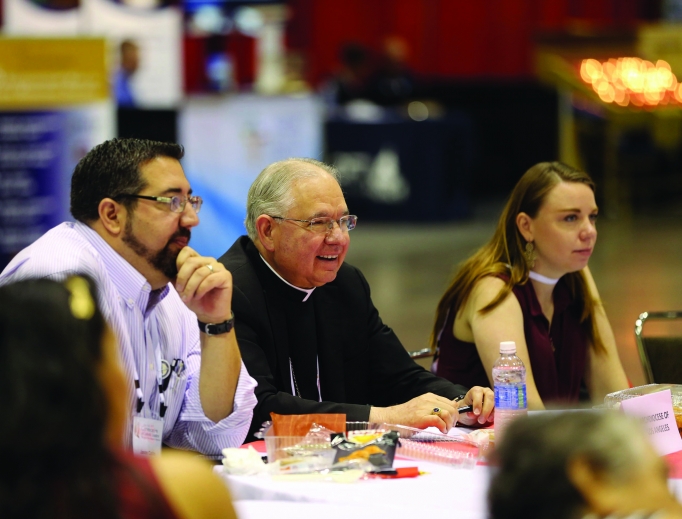
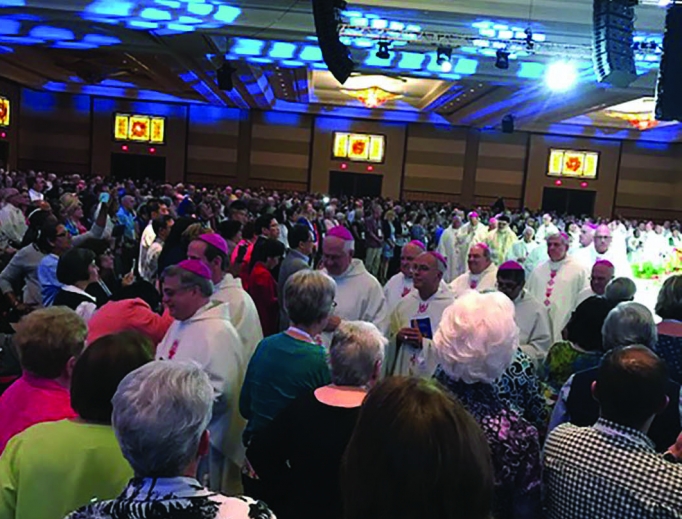
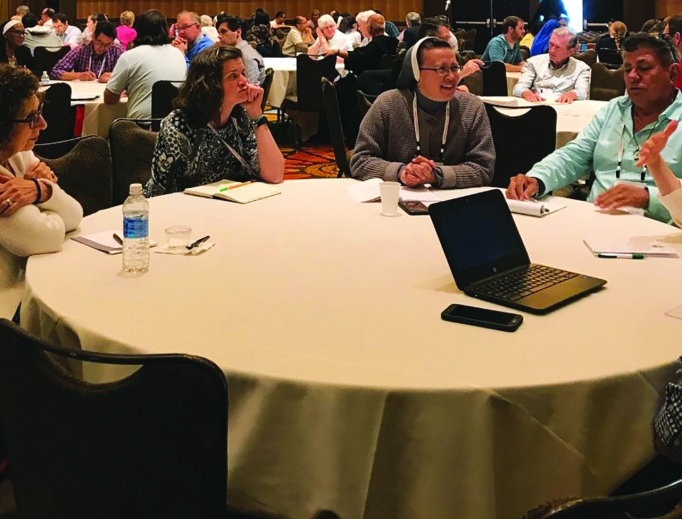
The convocation planners charted the landscape of the missionary field and examined the radical call to missionary discipleship. The United States today, they argued, must be viewed as mission territory at a time when the country is increasingly post-Christian or more realistically pre-Christian. As Pope Francis notes in Evangelii Gaudium, what is needed at this moment is “evangelical discernment” and a true commitment to “missionary discipleship” with awareness that every Christian is a missionary to the extent that he or she has encountered the love of God in Christ Jesus.
The other key takeaway from the plenary speakers was for Catholics to declare themselves in a permanent state of mission and that they must be missionary disciples going out to the peripheries.
Archbishop Gomez expressed powerfully the call to the peripheries. Citing Pope Francis, he taught that “the peripheries are ‘sociological,’ and they are ‘geographical.’ They are places on a map, places where people live. … But for Pope Francis, the peripheries are more than a physical location or a social category. They are places where poverty is not only material, but also spiritual. There are ‘existential peripheries’ — places where people are wounded and feel their life has no meaning and makes no difference. In the existential peripheries, men and women are caught in the webs of sin and addiction, in many kinds of slavery and self-deception. And the Pope is saying that these peripheries are growing in the modern world. And these peripheries are the new mission territory.”
What’s Next?
The stakes for the Church in the country and for the nation are immense. The convocation strove to equip Catholic leaders with tools, knowledge and a common purpose to meet the next years with confidence, but even more with the joy of true missionary disciples.
The convocation was the chance for all of them to talk, share ideas, network and pray together, including daily Masses, adoration, a powerful Eucharistic procession and Marian devotions.
What follows, the bishops hope, will be a time of apostolic zeal equal to the crises.
“I have heard of delegations already planning follow-up meetings,” Reyes told the Register, “and of discussions going on among the leadership of the organizations that were present, as well as ideas for regional meetings similar to the convocation. We will see what the Lord has in store; but by assembling leaders, the hope is that the impact finds its way into the work of these leaders quickly and effectively. The event itself exceeded expectations. I pray the efforts that come from it will exceed them, as well.”
In the closing Mass, Cardinal Daniel DiNardo, president of the bishops’ conference, used his homily to reflect on trust in Jesus Christ and how we are called to offer what we can to the Lord and expect that he will multiply our efforts as he did in John 6. When told by the apostles that they did not have enough to feed the gathered crowd, Cardinal DiNardo declared, “Jesus responds — not wagging a finger of disapproval at their less-than-excellent conduct, but he just looks at them and says, ‘Just give me what you have.’” The cardinal finished by telling the attendees as they prepared to leave for home, “We are in a very significant time in our Church in this country, and this reminds me of how contemplative we’re going to be if we want to be active. Never are you more active than when the word of God is overpowering you. You are seated there, in God’s loving grace, and you realize how much God can let you do.”
There was a sense in the halls and sessions that something important might come from this precedent-setting gathering, equal to the challenges facing the country and especially the Church. As Ospino noted in his keynote, “We are here at this convocation to set the course for what can be a new Catholic moment in the United States.”
Matthew Bunson, a Register senior editor, attended the convocation, providing coverage for the Register and EWTN.
- Keywords:
- church in america
- convocation of catholic leaders: the joy of the gospel in america
- matthew bunson
- new evangelization
















